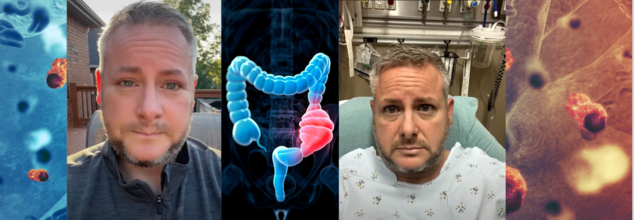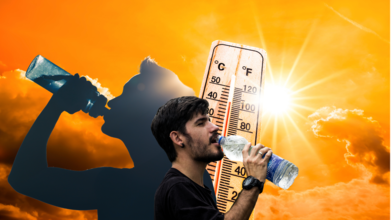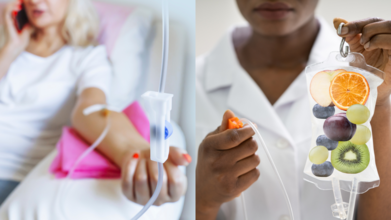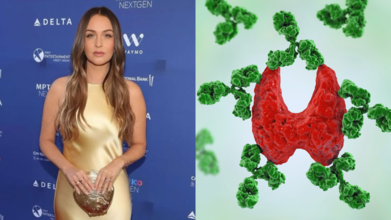- Health Conditions A-Z
- Health & Wellness
- Nutrition
- Fitness
- Health News
- Ayurveda
- Videos
- Medicine A-Z
- Parenting
- Web Stories
'I Thought It Was Just Constipation, Then I Was Hit With Terminal Cancer'- How This Everyday Symptom Turned Out To Be Stage 4 Bowel Cancer

Image Credit: Youtube/@ThePatientStory
For many, constipation is just an occasional nuisance—a side effect of diet, stress, or insufficient fluid intake. But for Springfield, Missouri, resident Shawn Michael, 48, what had appeared to be a minor case of digestive problems became a diagnosis that would change his life: terminal bowel cancer.
Michael, a loving father and entrepreneur, had no idea anything was wrong when he first had trouble passing stools last October. But when over-the-counter remedies didn't bring lasting relief, he began to suspect something more serious was going on. What ensued was a terrifying and tragic ordeal that he recounted in a viral YouTube video that has since racked up almost 100,000 views.
Michael first went for treatment at an urgent care facility, where physicians prescribed a strong laxative. The medication relieved his problem temporarily, but a persistent discomfort lingered. "Two days later, I could still physically feel something inside of me," he remembered. "It hurt so bad."
His symptoms escalated dramatically when he took a sip of a fizzy drink, triggering excruciating pain. Realizing this was no ordinary digestive issue, Michael returned to urgent care, where a CT scan revealed a mass in his colon. The nurse informed him that the indications pointed toward stage four colon cancer.
"The only thing on my mind was how to break it to my wife," he said. "She was sitting at home, waiting for me to come back."
Physicians swiftly scheduled Michael to have surgery taken out of the large blockage in his colon. When Michael awoke after the procedure, he discovered the tumor was big that his doctors were amazed that it had not ruptured. Unfortunately, however, the procedure also uncovered additional cancerous tumor growths along his omentum—a protective layer of fat that encloses the colon—as well as impacted lymph nodes.
In spite of their best efforts, doctors verified that the cancer had already invaded his liver, spleen, and lungs, a stage four diagnosis. Though this was heartbreaking news, Michael was optimistic, buoyed by his physicians' optimism for his age and overall health. "They told me not to think in terms of timeline," he explained. "With my general health, I have a very good chance of beating this."
Michael's treatment regimen involves chemotherapy for three months, followed by a hyperthermic intraperitoneal chemotherapy (HIPEC) procedure. This new treatment entails the direct infusion of heated chemotherapy drugs into the abdominal cavity, a technique thought to improve the effectiveness of the drugs and attack any remaining cancer cells more aggressively.
His is a stark reminder of increasing rates of bowel cancer among young adults. Last year, a study revealed an alarming increase in the number of cases of bowel cancer in adults between 25 and 49 years in 27 out of 50 countries from 2007 to 2017. The most rapid increases were seen in Chile, New Zealand, Puerto Rico, and England.
In the UK alone, cases of bowel cancer in adults aged 25-49 have risen by 52% since the early 1990s. What was once an older individual's disease, bowel cancer is now affecting younger populations, but many are not aware of the warning signs.
Symptoms and Treatment
Symptoms of bowel cancer can easily be mistaken for common digestive complaints, making early diagnosis challenging. Symptoms to be aware of include:
- Persistent constipation or alteration in bowel habits
- Blood in stool or rectal bleeding
- Abdominal pain, bloating, or a palpable lump
- Unintentional weight loss or weakness
Experts recommend that anyone suffering from these symptoms for over three weeks needs to seek medical care. Early detection dramatically increases the survival rate, which is why preventive health screening and check-ups are crucial.
Michael's is just one of a number of examples of the new geography of bowel cancer. One of the most famous recent cases is that of Deborah James, a.k.a. 'Bowel Babe,' diagnosed at the age of 35. James, who died in 2022, raised millions of pounds for cancer research and campaigned for early diagnosis and awareness.
Experts forecast that deaths from bowel cancer in the UK will increase by 2,500 a year by 2040, while diagnoses will go up by 10% during the same timeframe. In America, colorectal cancer is the second most common cause of cancer death among individuals below the age of 50.
Even with such dire figures, awareness is low. Most people still ignore signs such as constipation, dismissing them as trivial or passing pains.
Though his diagnosis is overwhelming, Michael is hopeful and persistent. His journey highlights the necessity of listening to the body and consulting a doctor when something does not feel right.
"If my story inspires even one person to get checked sooner, then it was worth telling," he said.
His experience is an important reminder: bowel cancer doesn't have to happen only to the older person. Young adults must also know the signs, stand up for their own health, and demand early screenings. With better awareness, earlier diagnosis, and ongoing improvements in treatment, more lives can be saved from this quiet but fatal disease.
Attention, Brits! This Is How Much Water You Should Really Be Glugging In A Heatwave

During a heatwave, adequate hydration becomes a health priority rather than a casual choice. High temperatures increase the body’s fluid loss through sweat, and without sufficient water intake, the risk of dehydration and heat-related illnesses rises significantly.
The Heatwave Hydration Rule
The NHS says your daily water needs depend on a few factors like your body weight, activity levels, and how much you are sweating like a contestant in a chilli-eating contest. When the mercury rises, so should your water intake. In short, a balmy 32 degrees Celsius is not the day to sip daintily on a single glass of H2O.According to Dr Sonali Ruder, who works as an emergency doctor, a good general rule is to drink about half your body weight in ounces of water. For example, if you weigh 150 pounds (around 68 kg), that is roughly 75 ounces (just over 2 litres) spread throughout the day. But if you are jogging in the park, hauling shopping in the midday sun, or simply existing in a non-air-conditioned flat, you will need to top that up.
Pregnant or breastfeeding? Your body’s running on extra hydration demands, so keep the bottle handy.
Tips to Keep the Water Flowing
The NHS recommends sticking to plain water for the best hydration hit. Chugging in big gulps is not as helpful as sipping regularly, so think of yourself as a plant that needs steady watering. If you have been sweating more than usual, from exercise or just standing still in the heat, up your intake.Invest in a large, insulated bottle that keeps your drink icy cold, and take it everywhere. You are more likely to sip without thinking if it is right there on your desk, in your bag, or even next to the kettle.
The Dark Side of Dehydration
Skipping water in a heatwave is like forgetting to charge your phone before a long day, except your body is much less forgiving. Dehydration happens when you are losing more fluids than you are taking in. Without enough water, your body cannot function at its best.Signs you might be running on empty include:
- Thirst (obvious, but often ignored)
- Dark yellow or strong-smelling urine
- Headaches and dizziness
- Fatigue or confusion
- Dry mouth, lips, and eyes
Left unchecked, dehydration can lead to heat exhaustion or heatstroke, which is a fast-track ticket to the hospital.
Can You Overdo It?
Surprisingly, yes. While staying hydrated is crucial, overhydrating can also cause problems. Drinking far too much water in a short space of time can dilute the sodium in your blood, leading to a condition called hyponatraemia. Symptoms include nausea, headaches, confusion, and, in extreme cases, seizures.
This is rare, but it is worth knowing that balance is key. Your goal is steady hydration, not winning a personal best in “litres consumed in an hour”. In the British heatwave, your best defence is a smart hydration plan. Sip water consistently, up your intake if you are sweating, and pay attention to your body’s signals. Keep your urine pale, your energy steady, and your insulated bottle close by.
The Truth About Vitamin Therapy for Perfect Skin and Lush Hair

From glossy Instagram reels to glossy foreheads, vitamin therapy has become the darling of beauty trends. It promises “instant glow” and “Rapunzel hair”, often in the form of IV drips or colourful capsules. But is it really a miracle elixir or just a very expensive placebo with better marketing? Dermatologists say it is a bit of both.
Vitamin therapy acts as a protective shield for your cells. According to Dr Pravin Banodkar, Co-Founder and Lead Dermatologist at Skin Beyond Borders, our skin and hair face daily assaults from pollution and dust to stress and hormonal changes. Over time, these factors wear down cell health, slow growth, and accelerate signs of ageing. For skin, that means hyperpigmentation and dullness. For hair, it often means thinning and increased shedding.
Vitamin therapy works by giving cells a protective boost through antioxidants, which fight off damage and keep things running smoothly. “It helps reverse some of the impact by preventing damage to hair cells and boosting repair processes,” Dr Banodkar explains.
When Life Gets in the Way of Nutrition
If your diet often looks like coffee for breakfast, desk snacks for lunch, and “something quick” for dinner, your skin and hair may already be paying the price. Dr Banodkar says that people with hectic routines often develop deficiencies in vitamins A, C, D, and essential micronutrients. Left unchecked, these gaps can shorten the hair growth cycle and weaken the skin’s barrier function.
For such cases, vitamin therapy – oral, topical, or even targeted IV – can help fill the gaps. But if you already eat a balanced diet and nourish yourself consistently, “high-dose supplementation and IV drips offer no extra benefit,” he adds. Meaning, if your body is not missing it, megadoses will not suddenly help.
Micronutrients
One of the buzzier developments in dermatology is the “micronutrient concept”, feeding the hair bulb with targeted nutrients to prolong the growth phase (known as the anagen phase). Examples include:
- Vitamin A: Promotes skin cell turnover, reduces acne
- Vitamin C: Boosts collagen production, brightens skin
- Vitamin E: Antioxidant that aids repair
- Biotin (B7): Supports hair and nail strength
- Vitamin D: Crucial for follicle health and immune function
- Niacin (B3): Improves skin texture and barrier
Used strategically, these can improve skin repair and help hair grow longer before shedding. But more is not always better.
The Hype vs The Hard Truth
Dr Aseem Sharma, Director and Chief Dermatologist at Skin Saga Centre for Dermatology, points out that vitamin therapy has its place but not as a monthly beauty ritual for those without a medical need. “If you are genuinely deficient in D, B12, or iron, correcting that can transform skin and hair. But topping up levels that are already normal rarely produces dramatic results,” he says.
Biotin, for example, is often marketed as the holy grail for hair growth. In reality, unless you are deficient, which is rare in healthy adults, it won’t magically transform thin hair into thick locks. Hair growth depends on protein intake, hormones, follicle health, and micronutrients working together.
Antioxidants
Vitami and glutathione can protect skin and hair from oxidative stress, the kind that speeds up ageing and damages follicles. But their benefits plateau once the body has enough. Overuse can even cause side effects, especially with fat-soluble vitamins that linger in the system. In other words, popping a week’s worth of supplements in one sitting won’t give you a week’s worth of glow; it might just give you an upset stomach.
Should You Book That Vitamin Drip?
Both Dr Banodkar and Dr Sharma agree: start with your diet. Focus on whole foods, adequate protein, and a rainbow of fruits and vegetables. Address specific deficiencies through tests, not guesswork. Save the IV drips for genuine medical needs, not pre-party touch-ups.
Vitamin therapy can be a useful support act, especially for people with nutritional gaps, malabsorption issues, or recovery needs. But it is not the headliner. Your real glow comes from a healthy lifestyle, consistent skincare, and, yes, the occasional salad that is not just for show.
‘Grey’s Anatomy’ Star Opens Up About Hashimoto’s Hypothyroidism: Know How This Autoimmune Disorder Can Impact Body and Mind

On her “Call It What It Is” podcast with co-star Jessica Capshaw, Grey’s Anatomy star Camilla Luddington revealed she had recently been diagnosed with Hashimoto’s hypothyroidism, an autoimmune condition that quietly messes with your thyroid and, by extension, your entire energy system.
Best known as Dr Jo Wilson, the 41-year-old Luddington admitted she had brushed off her constant tiredness, sluggishness, and need to curl up in bed as signs of getting older or hitting perimenopause. “Makes you a little slothy,” she joked, only half-serious. The truth was more complex and involved a surprisingly common yet under-discussed health disorder.
When “just tired” is something more
It started with a routine blood test. Her doctor spotted “one little thing” and, before she knew it, dropped the phrase “autoimmune disease” into the conversation. But the reassurance came quickly: Hashimoto’s is very common, especially among women in middle age.
Still, common does not mean harmless. Reportedly, Hashimoto’s slowly attacks the thyroid gland, the butterfly-shaped organ at the base of your neck that produces hormones controlling metabolism, temperature regulation, and a surprising list of bodily functions. Over time, the immune system’s misguided attack leads to a drop in hormone production, setting the stage for hypothyroidism.
The symptoms
Fatigue, dry skin, weight gain, and do not forget the cold intolerance, hair loss, and brain fog. According to the Mayo Clinic, these are just the tip of the symptom iceberg for Hashimoto’s, which can also cause constipation, muscle aches, joint pain, irregular menstrual cycles, depression, brittle nails, and even an enlarged thyroid (goitre). Sometimes symptoms creep in so gradually that people do not realise something is wrong.Luddington recognised several of these signs in hindsight, though she had been quick to explain them away. Now, with a diagnosis in hand, she’s on medication and back to exercising — a reminder that treatment can help restore some balance, even if there’s no cure.
Watch the video here:
Who’s at risk and why
Hashimoto’s can strike anyone, but middle-aged women top the risk list. Genetics may be part of the puzzle, along with environmental triggers like infections, chronic stress, or even radiation exposure.
And while the disease typically develops slowly, its reach is wide. If untreated, it can snowball into complications like heart problems, fertility issues, poor pregnancy outcomes, or a rare and life-threatening state called myxedema, where extreme hypothyroidism leads to unconsciousness.
The mental health connection
Hashimoto’s is not just a physical game-changer. Because thyroid hormones influence brain chemistry, untreated hypothyroidism can cause depression, anxiety, and severe mood changes. Luddington herself described feeling constantly run down, with a fatigue so deep it impacted her day-to-day life. This mental strain often gets overlooked, especially when symptoms overlap with other conditions.Treatment that works
Reportedly, thyroid hormone replacement therapy is the gold standard for treatment, often in the form of a daily pill that restores hormone levels. When managed well, it can make symptoms fade into the background. Lifestyle adjustments, such as regular exercise, good sleep habits, and balanced nutrition, can also help.
Luddington’s story is proof that a proper diagnosis can be life-changing and that even those with hectic Hollywood schedules need to listen to their bodies.
Why you shouldn’t ignore “little” symptoms
Feeling tired is not unusual. But when exhaustion comes with hair loss, weight changes, and a tendency to wear sweaters in 25-degree weather, it is worth checking your thyroid. As Luddington learnt, what seems like ordinary wear and tear can sometimes be a hormonal SOS.
If left untreated, Hashimoto’s can quietly chip away at your health for years, leading to cardiovascular risks, mental health struggles, and long-term organ strain. That is why timely diagnosis and treatment are not just medical niceties; they are essential.
The message is simple: fatigue is not always “just life”. Sometimes, it is your body asking for help and that call deserves an answer.
© 2024 Bennett, Coleman & Company Limited

